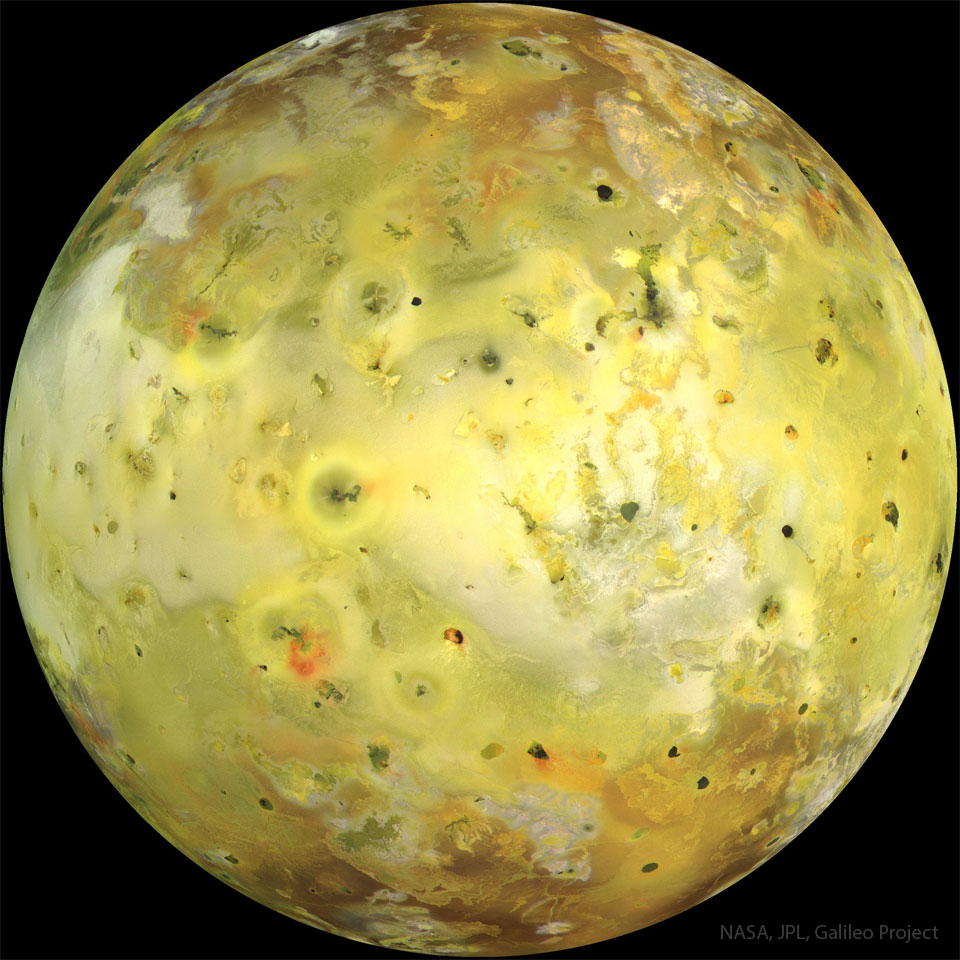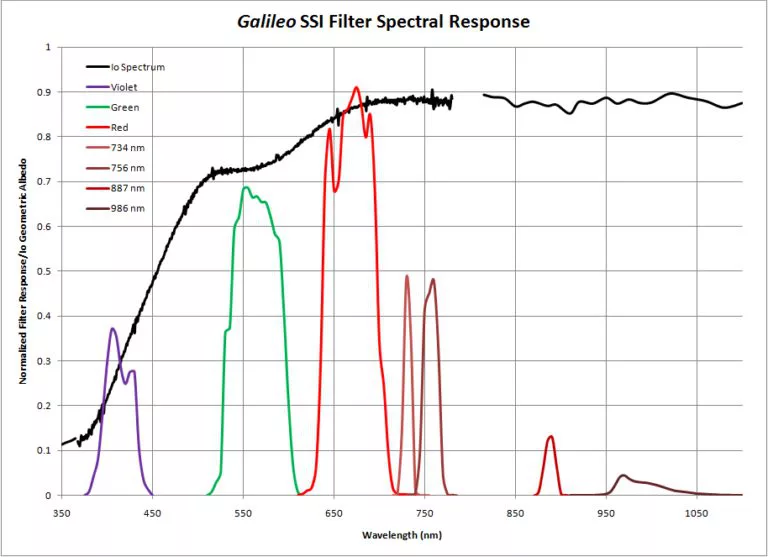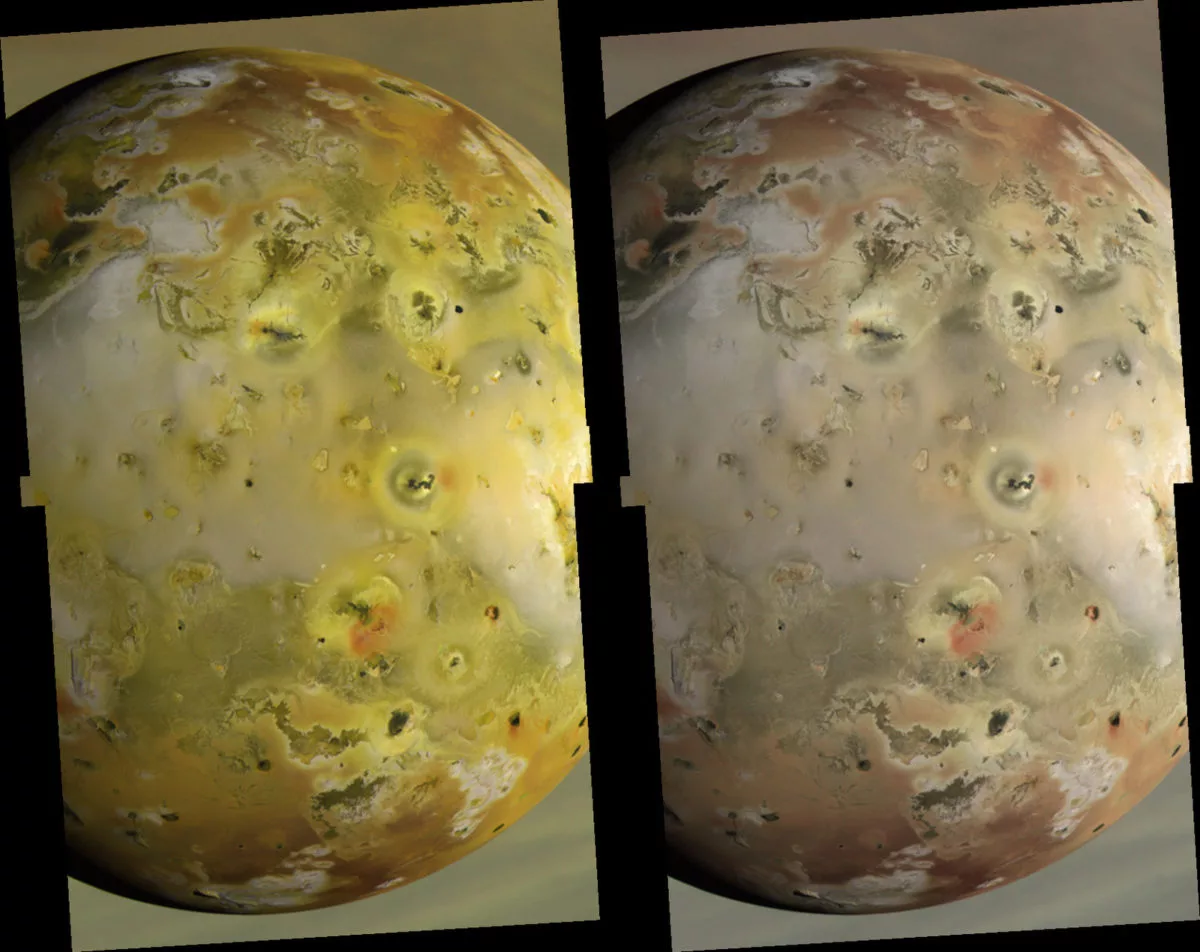Page 1 of 1
APOD: Io in True Color (2022 Dec 11)
Posted: Sun Dec 11, 2022 5:07 am
by APOD Robot
 Io in True Color
Explanation:
Io in True Color
Explanation: The strangest moon in the
Solar System is bright yellow. The
featured picture, an attempt to show how Io would appear in the "true colors" perceptible to the average human eye, was taken in 1999 July by the
Galileo spacecraft that orbited Jupiter from 1995 to 2003. Io's colors derive from
sulfur and molten
silicate rock. The unusual
surface of Io is kept very young by its system of
active volcanoes. The intense
tidal gravity of
Jupiter stretches
Io and damps wobbles caused by Jupiter's other
Galilean moons. The resulting
friction greatly heats
Io's interior, causing
molten rock to explode through the surface.
Io's volcanoes are so active that they are effectively turning the whole moon inside out. Some of
Io's volcanic lava is so hot it
glows in the dark.
Re: APOD: Io in True Color (2022 Dec 11)
Posted: Sun Dec 11, 2022 6:17 am
by Ann
Io may not be quite as yellow as it looks in the APOD. Check out this graph:
The graph shows the seven filters used by Galileo when it took the picture of Io. Galileo was equipped with one
violet filter, one
green filter and one
red filter, as well as four filters sensitive to infrared light.
As you can see, there is a big gap between the filter range of the violet filter and the green filter, or to put it differently: Galileo was unable to detect blue light with wavelengths between 450 and 500 nm from Io. But as you can see from the sloping black line, which represents the albedo (the reflectivity) of Io at different wavelengths, Io reflects more blue than violet light.
In short: Io reflects more blue light than the Galileo image suggests, and therefore is not as brightly yellow as Galileo made me look.
Read more about Jason Perry's attempts to reconstruct Io's true color
here.
We may also note that Io has volcanic eruptions with blue (or violet?) plumes.
Io is the most volcanically active body in the Solar system.
Ann
Re: APOD: Io in True Color (2022 Dec 11)
Posted: Sun Dec 11, 2022 2:52 pm
by JohnD
Luke Jerram is an English installation artist - his works have included the Museum of the Moon:
And Gaia,
Both have been seen around the world, including at the Lancaster Priory. Huis latest work, Mars, is on tour.
What a good subject would Io be for his work!
John
Re: APOD: Io in True Color (2022 Dec 11)
Posted: Sun Dec 11, 2022 3:26 pm
by Chris Peterson
Ann wrote: ↑Sun Dec 11, 2022 6:17 am
Io may not be quite as yellow as it looks in the APOD. Check out this graph:
It's hugely challenging to figure out what something would look like to our eyes from any image data source. The number of variables is staggering. We have the nature of the object, which may have a combination of continuum reflection (the color of which also depends on the nature of the illumination) along with some narrow band reflection (or in some cases emission). We have the complex passbands of the filters that are used. This goes through some kind of processing and gets mapped to three channels, which go to our display devices, which have their own complex emission bands for each of those channels. And most people don't have calibrated displays, so there's a lot of variation there. The brightness of our displays and of the environment we view them in also changes our color perception. And all of this is putting light into our eyes, which have no receptors for red, green, or blue at all! So yet another mapping as our two yellow and one violet sensors respond.
Oh my!
Re: APOD: Io in True Color (2022 Dec 11)
Posted: Sun Dec 11, 2022 3:53 pm
by orin stepanek
Back a few years ago; when I first saw Galileo's photos of Io; I was
amazed at how much it looked like a pizza!

It still does!

Beautiful view; I like it!
Re: APOD: Io in True Color (2022 Dec 11)
Posted: Sun Dec 11, 2022 4:06 pm
by Chris Peterson
orin stepanek wrote: ↑Sun Dec 11, 2022 3:53 pm
ioprometheus_galileo.jpg
Back a few years ago; when I first saw Galileo's photos of Io; I was
amazed at how much it looked like a pizza! :mrgreen: It still does! :lol2:
Beautiful view; I like it!
Not like any pizza I want to eat! Maybe a pizza that's been sitting in a dumpster for a week.
Re: APOD: Io in True Color (2022 Dec 11)
Posted: Sun Dec 11, 2022 4:59 pm
by orin stepanek
Chris Peterson wrote: ↑Sun Dec 11, 2022 4:06 pm
orin stepanek wrote: ↑Sun Dec 11, 2022 3:53 pm
ioprometheus_galileo.jpg
Back a few years ago; when I first saw Galileo's photos of Io; I was
amazed at how much it looked like a pizza!

It still does!

Beautiful view; I like it!
Not like any pizza I want to eat! Maybe a pizza that's been sitting in a dumpster for a week.
I don't eat pizza any more; but it resembles a cheese pizza without any sauce!

Re: APOD: Io in True Color (2022 Dec 11)
Posted: Sun Dec 11, 2022 8:32 pm
by johnnydeep
What's the significance of this statement, if any, to the tidal friction - "damps wobbles caused by Jupiter's other Galilean moons"? I would think any "wobble" would only contribute to
increasing the effect of tidal friction!
I do read at Wikipedia the following:
https://en.wikipedia.org/wiki/Io_(moon)#Tidal_heating wrote:Unlike Earth and the Moon, Io's main source of internal heat comes from tidal dissipation rather than radioactive isotope decay, the result of Io's orbital resonance with Europa and Ganymede.[48] Such heating is dependent on Io's distance from Jupiter, its orbital eccentricity, the composition of its interior, and its physical state.[85] Its Laplace resonance with Europa and Ganymede maintains Io's eccentricity and prevents tidal dissipation within Io from circularizing its orbit. The resonant orbit also helps to maintain Io's distance from Jupiter; otherwise tides raised on Jupiter would cause Io to slowly spiral outward from its parent planet.[89] The tidal forces experienced by Io are about 20,000 times stronger than the tidal forces Earth experiences due to the Moon, and the vertical differences in its tidal bulge, between the times Io is at periapsis and apoapsis in its orbit, could be as much as 100 m (330 ft).[90] The friction or tidal dissipation produced in Io's interior due to this varying tidal pull, which, without the resonant orbit, would have gone into circularizing Io's orbit instead, creates significant tidal heating within Io's interior, melting a significant amount of Io's mantle and core.
Does the mentioned "wobble dampening" refer to any of that, or something else?
Re: APOD: Io in True Color (2022 Dec 11)
Posted: Sun Dec 11, 2022 9:18 pm
by Tekija
Chris Peterson wrote: ↑Sun Dec 11, 2022 3:26 pm
Ann wrote: ↑Sun Dec 11, 2022 6:17 am
Io may not be quite as yellow as it looks in the APOD. Check out this graph:
It's hugely challenging to figure out what something would look like to our eyes from any image data source. The number of variables is staggering. We have the nature of the object, which may have a combination of continuum reflection (the color of which also depends on the nature of the illumination) along with some narrow band reflection (or in some cases emission). We have the complex passbands of the filters that are used. This goes through some kind of processing and gets mapped to three channels, which go to our display devices, which have their own complex emission bands for each of those channels. And most people don't have calibrated displays, so there's a lot of variation there. The brightness of our displays and of the environment we view them in also changes our color perception. And all of this is putting light into our eyes, which have no receptors for red, green, or blue at all! So yet another mapping as our two yellow and one violet sensors respond.
Oh my!
https://midimagic.sgc-hosting.com/huvision.htm
Re: APOD: Io in True Color (2022 Dec 11)
Posted: Sun Dec 11, 2022 9:23 pm
by heehaw
...that's Amore!
Re: APOD: Io in True Color (2022 Dec 11)
Posted: Sun Dec 11, 2022 10:15 pm
by hypatia
orin stepanek wrote: ↑Sun Dec 11, 2022 3:53 pm
ioprometheus_galileo.jpg
Back a few years ago; when I first saw Galileo's photos of Io; I was
amazed at how much it looked like a pizza!

It still does!

Beautiful view; I like it!
My first thought was moldy cheese.
Re: APOD: Io in True Color (2022 Dec 11)
Posted: Mon Dec 12, 2022 1:39 pm
by orin stepanek
hypatia wrote: ↑Sun Dec 11, 2022 10:15 pm
orin stepanek wrote: ↑Sun Dec 11, 2022 3:53 pm
ioprometheus_galileo.jpg
Back a few years ago; when I first saw Galileo's photos of Io; I was
amazed at how much it looked like a pizza!

It still does!

Beautiful view; I like it!
My first thought was moldy cheese.
Blue cheese?
Re: APOD: Io in True Color (2022 Dec 11)
Posted: Mon Dec 12, 2022 7:31 pm
by hypatia
orin stepanek wrote: ↑Mon Dec 12, 2022 1:39 pm
hypatia wrote: ↑Sun Dec 11, 2022 10:15 pm
orin stepanek wrote: ↑Sun Dec 11, 2022 3:53 pm
ioprometheus_galileo.jpg
Back a few years ago; when I first saw Galileo's photos of Io; I was
amazed at how much it looked like a pizza!

It still does!

Beautiful view; I like it!
My first thought was moldy cheese.
Blue cheese?
Nope, a truly bad, moldy cheese.
 Io in True Color
Io in True Color


